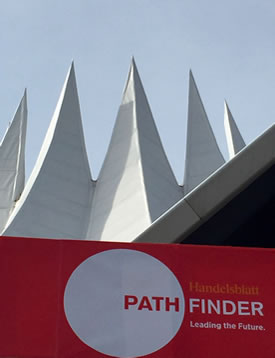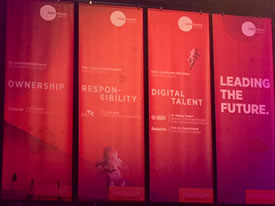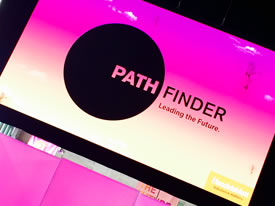8. June 2016
 SYNNECTA and the Pathfinders almost have a tradition by now! We met once again this year in Berlin on May 1st with CEOs of leading companies, inspiring speakers and about 800 talents from Allianz, Daimler, Siemens, Deutsche Bank, Deloitte and Techniker Krankenkasse. The CEOs chose a speaker on a topic that was relevant to them and invited about 100 talents from their own company in order to spend the Labor Day holiday together engaging in an intensive exchange on topics for the future.
SYNNECTA and the Pathfinders almost have a tradition by now! We met once again this year in Berlin on May 1st with CEOs of leading companies, inspiring speakers and about 800 talents from Allianz, Daimler, Siemens, Deutsche Bank, Deloitte and Techniker Krankenkasse. The CEOs chose a speaker on a topic that was relevant to them and invited about 100 talents from their own company in order to spend the Labor Day holiday together engaging in an intensive exchange on topics for the future.
Joe Kaeser (CEO Siemens AG) invited Dr. Jonas Ridderstraele, author of the book Funky Business from the year 2000 and Reenergizing the Corporation, How Leaders make Change Happen from 2008. The cultures of successful companies create spaces where creativity can develop and the willingness to take risks as well as entrepreneurship can flourish as distinctive values. Successful companies are highly innovative, easily ready to experiment and heterarchic. The move from hierarchic leadership to independent organization and the way guidance from the top is turned into lateral attention were just some of the insights Ridderstraela was able to present in a lively and enjoyable presentation.
Dieter Zetsche (CEO Daimler AG) brought along renowned dancer Eric Gauthier from Theaterhaus Stuttgart, who worked and danced with the audience in the Tempodrom under the heading of »Spirit«. Gauthier convincingly moved the people and got them to resonate.
Jürgen Fitschen (Co-CEO Deutsche Bank), was clearly more relaxed than last year, enjoying the last to weeks in his current post. He had invited »horse whisperer« Linda Weritz, a communication scientist and psychologist from Dusseldorf who specializes on horses. Linda Weritz is a passionate and successful dressage rider. She has developed a unique training concept that consistently respects and values the nature of horses and therefore makes it possible to train horses without any use of violence at all. It became very clear how the principles of her training concept can be applied to management in companies and how important and decisive empathy and trust are in management processes.
Jens Baas (CEO Techniker Krankenkasse) introduced computer scientist and artist Prof. Jürgen Schmidhuber. His groundbreaking research has revolutionized the idea of optimal forecasts made from past data. He deals with machine learning, neuronal networks, Kolmogorov complexity, digital physics, robotics, low-complexity art and theory of beauty.
Schmidhuber showed great courage when he introduced his Gödel machine for the solution of any computable problem. Using an asymptotic optimum theorem proof technique, the Gödel machine overwrites any parts of its code as soon as it has found proof that this will improve its future performance. We humans stick to old behavior and thought for much longer, even when we have long since recognized that something different will make us perform better in the future: we are »clearly programmed differently«. Add to that the enormous digital possibilities and robotics that create new perspectives – we were truly led towards »leading the future«.
 Oliver Bäte (CEO Allianz) had invited Gary Hamel from the London Business School, who spoke about »Added Value«. He forcefully repeated the valuable thoughts set out in his most recent book (2012): What Matters Now: How to Win in a World of Relentless Change, Ferocious Competition, and Unstoppable Innovation. It is about rethinking and new thinking, independent organization and experimenting in a world of business that needs to increasingly move away from hierarchy and bureaucracy on the one hand in order to meet the demands of the customers and on the other hand to meet the young generation’s needs.
Oliver Bäte (CEO Allianz) had invited Gary Hamel from the London Business School, who spoke about »Added Value«. He forcefully repeated the valuable thoughts set out in his most recent book (2012): What Matters Now: How to Win in a World of Relentless Change, Ferocious Competition, and Unstoppable Innovation. It is about rethinking and new thinking, independent organization and experimenting in a world of business that needs to increasingly move away from hierarchy and bureaucracy on the one hand in order to meet the demands of the customers and on the other hand to meet the young generation’s needs.
Markus Kerber (BDI) and Martin Pleindl (Deloitte) decided to bring in Prof. Dr. Yasmin Mei-Yee Weiss. She is a German-Chinese academic who spoke about »Digital Talent and Digital Leadership«. In her lecture, she cited the previously unpublished results of an extensive study on skills in the digital age. One of the requirements of digital leadership is proper technological and digital competence. This research, however, identifies an entirely different skill as the most important: the ability to bring together and lead »truly diverse« teams. We are eagerly awaiting publication of the research in the summer and will report in our blog.
There was a particularly moving, golden moment at the very beginning, when Julia Engelmann spoke right to the hearts of the audience. A bright moment given to us by the young actress and Poetry Slammer from Bremen with her poem! It was an inspiring, sunny day in Berlin.
However, at the end of Pathfinder 2016 it is tempting to imagine what it would be like if the tables were turned: what if the motivators and speakers were chosen by the talents instead of the CEOs, what if there was a little more time available for interaction, participation and dialogue? Doing so would use an important opportunity to reflect that dominant call to let go of hierarchies and foster independent organization and participation in the very design of the event.
The event organizer, the business newspaper Handelsblatt, also celebrated its 70th anniversary on the same weekend. SYNNECTA is extending its warmest congratulations on this proud day and on the wonderful event in Berlin.
Jörg Müngersdorff
8. May 2015
 CEOs chose a forward-looking topic, nominated speakers and about a hundred talents each from their own organization to meet in an aeroplane hangar at the former airport Tempelhof in Berlin on Labour Day. It was a successful idea, and there was a passionate host: Gabor Steingart, CEO of the Handelsblatt publishing group.
CEOs chose a forward-looking topic, nominated speakers and about a hundred talents each from their own organization to meet in an aeroplane hangar at the former airport Tempelhof in Berlin on Labour Day. It was a successful idea, and there was a passionate host: Gabor Steingart, CEO of the Handelsblatt publishing group.
SYNNECTA participated as a guest. It was a good opportunity for SYNNECTA to see clients once again and meet the next generation as well as encountering familiar topics and pioneers.
The CEO of Bayer AG Marijn Dekkers announced risk researcher Ortwin Renn from Stuttgart, who gave a lively and knowledgeable explanation that innovation needs a culture of readiness to assume risk. He also described how the augmentation of individual risks by media leads us to seriously overestimate these while we underestimate and partly displace other real, but abstract, risks – such as global warming. The chairman of the supervisory board of Daimler AG, Manfred Bischoff, had invited physicist Michael Feindt from Karlsruhe to speak on algorisms and automated decisions that decisively raise the quality of decision-making for all repetitive decisions. However, this does not apply for strategic decisions on the way to the future, for which we cannot make use of existing data. No amount of data collection ascertainment of decisions can replace »gut instinct« there.
Jürgen Fitschen, Co-CEO of Deutsche Bank had chosen the topic trust and invited extreme climber and businessman Stefan Glowacz. He gave an authentic presentation at hand of the story of three attempts at a first ascent of a mountain in Patagonia that showed how many dimensions of trust come together to make possible the performance of an extreme achievement under extreme conditions. There is trust in one’s own plans, the material and the team as well as trust in the goal as the decisive motivator above all. Johannes Teyssen, CEO of E.ON had selected the topic re-invention and chosen American investor and multi-millionaire Steve Westly to speak. The speaker described digitalization and networking as the driving forces of a development that in themselves pose a challenge to current business models. Westly also used anecdotes to bring personalities like Steve Jobs and Elon Musk into the room: they revolutionized industries with visionary force and determined persistency.
Jens Baas, CEO of Techniker Krankenkasse nominated philosopher and journalist David Precht to illuminate the concept of appraisal. The speaker gave a fundamental explanation why people are existentially dependent on appraisal and why it is intrinsic to human behaviour. There followed rounds of conversations with participating talents that covered values such as satisfaction, fairness, love, morality and cooperation.
Bernhard Mattes, chairman of the management board of the Ford works and president of the American Chamber of Commerce in Germany announced the topic diversity for innovation. Markus Hengstschläger is a human genetics expert from Vienna. He demonstrated how our society systematically produces »mediocricy« that is produced in family backgrounds, Kindergardens and schools and even the development of business managers. We are conditioned not to attract attention, to keep in line and we have to work on our weaknesses in a system that concentrates on deficits while our outstanding abilities waste away. We live in fast, unpredictable times: we need diversty and difference in order to master the challenges it brings. Hengstschläger delivered a speech full of expert knowledge at the highest level, telling analogies, humour and a seminal message – the standing ovation was well deserved.
Gabor Steingart introduced the topic revolution and passionately advanced his conviction that the enlightenment is not a completed era but now more than ever is in fact a universal social duty that could certainly result in a modern revolution. He referenced the economist Tomas Sedlacek who had already touched on the topic from another point of view with a book on »(R)evolutionary Economics?« together with David Graeber. Sedlacek is convinced that the logic of the free market and an economy of growth that is still in place cannot be maintained.
For us, the event was a reunion with our clients, including CEOs with whom we have successfully worked together in great change projects. It was also important for us to see that the topics we are dealing with are ever more appreciated by a broader public. Value and trust have always been the basis of a sustainiable business culture. On July 5, we will dedicate a special open event in Cologne to our topic »diversity and inclusion«, which is still an untapped dimension that is instrumental to business success.
Prof. Hengstschläger gave a deeply convincing presentation of the significance of diversity for innovation. It was certainly no coincidence that the CEOs who met in the hangar at Tempelhof on May 1, 2015 were all white, middle-aged men. Our initiative »New leadership for a new world« takes account of the transformative dynamics conjured up by Westly and analysed by Sedlacek.
SYNNECTA has already established a context for this mosaic-like effective topics and supports businesses and managers on their way to sustainable modernity. The SYNNECTA future check and our organizational development approaches for agile organizations factor in the findings presented and discussed at the pathfinders 2015 event. We will incidentally discuss these approaches on June 10 with HR managers from a range of organizations in an HR round table. SYNNECTA will also elucidate them in a lecture to be held in Cologne on September 15 at Zukunft Personal 2015.
Since labour day, another 800 young leadership talents have been inspired by the topics of the future. Pathfinder 2015 was a successful event! It is good to know that more and more people are joining up to design the future together.
Jörg Müngersdorff
 SYNNECTA and the Pathfinders almost have a tradition by now! We met once again this year in Berlin on May 1st with CEOs of leading companies, inspiring speakers and about 800 talents from Allianz, Daimler, Siemens, Deutsche Bank, Deloitte and Techniker Krankenkasse. The CEOs chose a speaker on a topic that was relevant to them and invited about 100 talents from their own company in order to spend the Labor Day holiday together engaging in an intensive exchange on topics for the future.
SYNNECTA and the Pathfinders almost have a tradition by now! We met once again this year in Berlin on May 1st with CEOs of leading companies, inspiring speakers and about 800 talents from Allianz, Daimler, Siemens, Deutsche Bank, Deloitte and Techniker Krankenkasse. The CEOs chose a speaker on a topic that was relevant to them and invited about 100 talents from their own company in order to spend the Labor Day holiday together engaging in an intensive exchange on topics for the future. Oliver Bäte (CEO Allianz) had invited Gary Hamel from the London Business School, who spoke about »Added Value«. He forcefully repeated the valuable thoughts set out in his most recent book (2012): What Matters Now: How to Win in a World of Relentless Change, Ferocious Competition, and Unstoppable Innovation. It is about rethinking and new thinking, independent organization and experimenting in a world of business that needs to increasingly move away from hierarchy and bureaucracy on the one hand in order to meet the demands of the customers and on the other hand to meet the young generation’s needs.
Oliver Bäte (CEO Allianz) had invited Gary Hamel from the London Business School, who spoke about »Added Value«. He forcefully repeated the valuable thoughts set out in his most recent book (2012): What Matters Now: How to Win in a World of Relentless Change, Ferocious Competition, and Unstoppable Innovation. It is about rethinking and new thinking, independent organization and experimenting in a world of business that needs to increasingly move away from hierarchy and bureaucracy on the one hand in order to meet the demands of the customers and on the other hand to meet the young generation’s needs.
 CEOs chose a forward-looking topic, nominated speakers and about a hundred talents each from their own organization to meet in an aeroplane hangar at the former airport Tempelhof in Berlin on Labour Day. It was a successful idea, and there was a passionate host: Gabor Steingart, CEO of the Handelsblatt publishing group.
CEOs chose a forward-looking topic, nominated speakers and about a hundred talents each from their own organization to meet in an aeroplane hangar at the former airport Tempelhof in Berlin on Labour Day. It was a successful idea, and there was a passionate host: Gabor Steingart, CEO of the Handelsblatt publishing group.